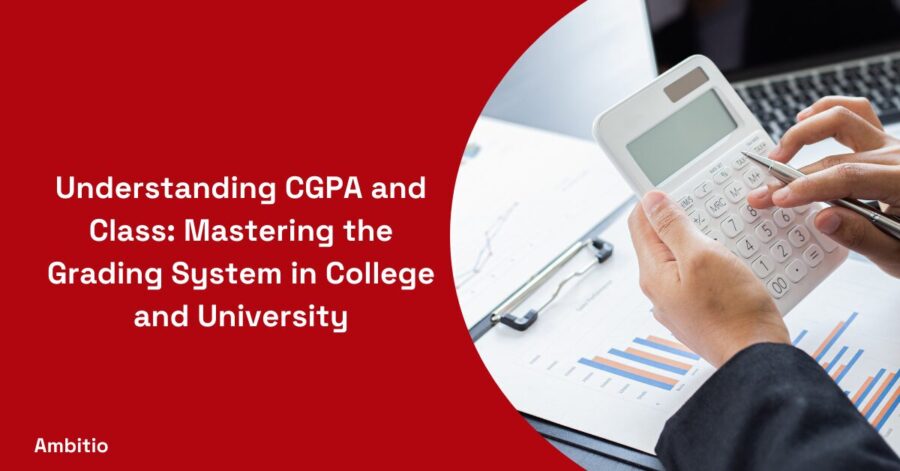13 December 2024
6 minutes read
Understanding CGPA and Class: Mastering the Grading System in College and University

The Essentials of CGPA in the College and University Grading System
What is CGPA and How is it Integral to Academic Classification?
The Concept and Calculation of CGPA
The Cumulative Grade Point Average (CGPA) is a pivotal aspect of the grading system in colleges and universities, reflecting a student’s overall academic performance.
Unlike individual grades that represent performance in a single course or exam, CGPA aggregates grade points across multiple courses or semesters, providing a comprehensive view of a student’s academic standing.
To calculate CGPA, students sum the grade points for all courses taken and divide this total by the number of courses. This average, typically on a scale of 0 to 10 or 0 to 4, is the CGPA, which helps in gauging a student’s proficiency and understanding in their chosen field of study.
Importance of CGPA in Academic and Professional Scenarios
CGPA is more than just a number; it plays a crucial role in various academic and professional scenarios. For students seeking higher education opportunities, a high CGPA can be a ticket to top universities or scholarship programs.
In the professional world, many employers consider a candidate’s CGPA as an indicator of their academic commitment and knowledge depth. Thus, maintaining a strong CGPA is often crucial for opening doors to advanced studies and rewarding career paths.
Unraveling the Process of CGPA Calculation and its Significance
Step-by-Step Guide to Calculating Your CGPA
Calculating your Cumulative Grade Point Average (CGPA) is a straightforward process, but it requires careful attention to detail. Here’s a step-by-step guide to help you accurately calculate your CGPA:
- Understand Your Grading Scale: Begin by familiarizing yourself with the grading scale used by your educational institution. Different institutions may use different scales (like 0 to 4, 0 to 10, etc.), and each letter grade (A, B, C, etc.) corresponds to a specific numeric value or grade point.
- Convert Grades to Grade Points: For each course, convert your letter grade to its corresponding grade point. For instance, on a 0 to 4 scale, an ‘A’ might be equivalent to 4, a ‘B’ to 3, and so on.
- Multiply by Credit Hours: Once you have the grade points, multiply each by the number of credit hours or units of the corresponding course. This gives you the total grade points for each course.
- Sum Total Grade Points: Add up the total grade points for all the courses you have taken. This sum is the numerator in the CGPA calculation.
- Total Credit Hours: Calculate the total number of credit hours by adding up the credit hours of all the courses you have taken. This will be the denominator in your CGPA calculation.
- Divide and Calculate CGPA: Divide the total grade points (from Step 4) by the total number of credit hours (from Step 5). The result is your CGPA.
- Round Off: If necessary, round off the CGPA to the decimal places as specified by your institution’s guidelines.
- Continuous Update: It’s important to update your CGPA calculation regularly, typically at the end of each semester, to reflect your most current academic standing.
- Check for Errors: Always double-check your calculations for any errors. Mistakes in multiplication or addition can significantly alter your CGPA.
- Understand the Context: Remember that CGPA is just one metric of your academic performance. It’s important to understand its role in your overall academic and career objectives.
CGPA’s Role in Shaping a Student’s Academic Journey
CGPA isn’t just a reflection of what you’ve learned; it significantly shapes your academic journey. A high CGPA can enhance a student’s self-esteem and motivation, driving them to achieve more.
It also comes into play during admissions for further studies, where institutions often set CGPA benchmarks. In some cases, it can even influence the eligibility for participating in extracurricular activities or taking on leadership roles within the university.
CGPA to Percentage Conversion: Bridging the Understanding Gap
Understanding and Implementing CGPA to Percentage Conversion
Converting CGPA to a percentage can help students and stakeholders understand academic performance in a more universally recognized format. This conversion is particularly useful when applying to institutions or job markets that rely on percentage scores.
The conversion process typically involves multiplying the CGPA by a fixed number, which varies according to the specific educational board or university’s policy. For example, in the CBSE system, multiplying the CGPA by 9.5 gives the equivalent percentage.
The Relevance of Percentage Conversion in Global Academia
The relevance of converting CGPA to percentage is particularly pronounced in the context of global academia. With educational systems varying significantly across countries, the percentage provides a common ground for evaluating academic credentials. This conversion is crucial for students applying for international programs or jobs where the education system differs from their own.
The Influence of Continuous Assessment on CGPA
Role of Assignments and Continuous Assessments in CGPA Calculation
Continuous assessment, including assignments, quizzes, and projects, significantly influences CGPA. These assessments encourage consistent study habits and understanding of the course material, rather than relying solely on final exams.
They contribute to a portion of the grade in each course, impacting the final CGPA. This system ensures a more rounded evaluation of a student’s capabilities, accounting for different types of learning and skills.
Balancing Exams and Continuous Assessments for Optimal CGPA
Balancing exams and continuous assessments is crucial for maintaining a high CGPA. While final exams often carry significant weight, regular assignments and projects can cumulatively impact the final grade.
Students should aim for consistency in their performance throughout the semester, as this will lead to a more stable and potentially higher CGPA. Time management and continuous engagement with the course material are key strategies in this balancing act.
Navigating CGPA in Critical Academic Years: Class 10 and 12
Understanding the Significance of CGPA in School Examinations
In critical academic years like Class 10 and 12, the CGPA holds significant importance. These years are often considered milestones in a student’s academic journey, and a high CGPA can open doors to prestigious higher education institutions and preferred study streams. Students must understand the calculation and improvement strategies for CGPA, as these scores can be decisive for their academic and professional futures.
Strategies for Maximizing CGPA in High School
Maximizing your Cumulative Grade Point Average (CGPA) in high school is crucial for opening up opportunities in higher education and future career paths. Here are some effective strategies to help you achieve a higher CGPA:
- Understand the Grading System: Familiarize yourself with how your school calculates grades and CGPA. Understanding the system helps you target your efforts effectively.
- Set Achievable Goals: Set clear, achievable academic goals for each term or semester. This helps in maintaining focus and gives you a target to work towards.
- Prioritize Time Management: Effective time management is key. Allocate specific times for study, homework, and revision while balancing extracurricular activities.
- Regular Study Habits: Develop a consistent study routine. Regular studying helps in better understanding and retention of the material, which is crucial for exams.
- Focus on Weak Subjects: Identify subjects where you have scope for improvement and devote extra time to them. Don’t neglect your stronger subjects, but balancing your efforts can significantly boost your overall CGPA.
- Use Available Resources: Utilize resources such as tutoring, study groups, online forums, or extra classes offered by your school. These can provide additional support and clarification on complex topics.
- Engage in Class Activities: Actively participate in class discussions, group projects, and other activities. Engagement in class often translates to a better understanding of the material.
- Seek Feedback: Regularly ask for feedback from teachers on your performance and areas of improvement. Constructive feedback can guide you to better study methods and understanding.
- Practice Past Papers: Solve previous years’ exam papers and sample questions. This practice can greatly aid in understanding the examination pattern and time management during exams.
- Take Care of Your Health: Maintain a healthy lifestyle, including proper nutrition and adequate sleep. Physical and mental well-being significantly impacts academic performance.
- Stay Motivated: Keep yourself motivated and focused on your goals. Recognize and celebrate small achievements to maintain high morale.
- Review and Reflect: Regularly review your academic progress and reflect on your study methods. Be open to changing strategies that are not working.
By following these strategies, you can effectively enhance your academic performance and maximize your CGPA in high school. Remember, consistency and dedication are key to academic success.
The Broader Perspective: CGPA in the Context of Lifelong Learning
CGPA as a Reflection of Learning, Not Just Grades
CGPA is often seen as a measure of academic success, but it’s essential to view it as a reflection of learning. A high CGPA typically indicates a good grasp of the course material and a strong foundation in the subject matter, which is invaluable in lifelong learning. It’s not just about achieving high grades but about understanding concepts that can be applied in real-world scenarios.
Beyond Academia: The Role of CGPA in Professional Growth
In professional life, CGPA can play a significant role, especially for fresh graduates. It can influence job opportunities, as many employers consider CGPA a marker of a candidate’s diligence and ability to learn.
However, it’s also important to balance academic performance with soft skills and practical experiences, as these are equally valued in the professional world.
FAQs
Q1: What is the difference between GPA and CGPA?
GPA (Grade Point Average) typically refers to the average grade points earned in a single semester or term, while CGPA (Cumulative Grade Point Average) is the average of these points across multiple semesters or the entire duration of the program.
Q2: Can CGPA be improved over time?
Yes, CGPA can be improved by performing well in subsequent semesters. Focusing on areas of improvement and maintaining a consistent study routine can significantly boost your CGPA.
Q3: How important is CGPA for graduate school admissions?
CGPA is an important criterion for graduate school admissions, as it reflects a student’s academic capabilities and knowledge base. However, it’s not the only factor considered; research experience, recommendations, and entrance exam scores also play vital roles.
Q4: Do employers always consider CGPA for job placements?
While many employers consider CGPA, especially for entry-level positions, it’s not the sole factor. Work experience, internships, skills, and personal interviews also significantly influence hiring decisions.
Q5: Is it possible to convert CGPA to a letter grade system?
Yes, CGPA can be converted to a letter grade system based on the specific conversion criteria set by educational institutions or employers. This conversion allows for a more straightforward comparison with other grading systems.

You can study at top universities worldwide!
Get expert tips and tricks to get into top universities with a free expert session.
Book Your Free 30-Minute Session Now! Book a call now




























